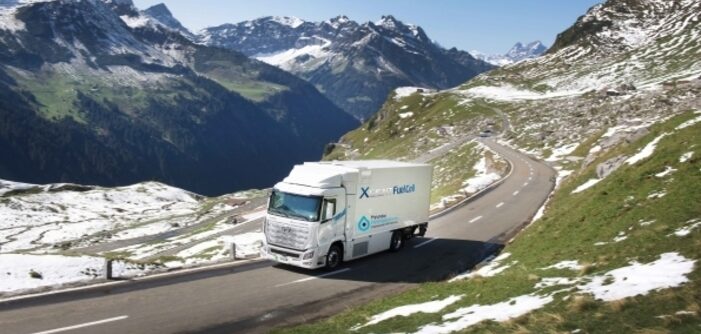Hyundai Hydrogen Mobility’s fleet of Xcient fuel cell trucks has, says the manufacturer, collectively exceeded one million kilometers of driving in only 11 months of service in Switzerland. During that time, the fleet is claimed to have reduced CO2 emissions by an estimated 630 tons compared with diesel-powered vehicles. Since hitting Swiss roads last October, the fleet of 46 hydrogen fuel cell trucks has been able to reach this milestone in the service of 25 Swiss companies in logistics, distribution and supermarket fulfillment.
“Swiss transport and logistics companies are convinced that hydrogen fuel cell commercial vehicles have the greatest potential among various alternative-energy vehicles. The member companies do not stop at simply introducing hydrogen fuel cell trucks. They have high expectations for the hydrogen energy source that holds great potential for the future, and believe that hydrogen will be the key for transitioning to eco-friendly energy,” said Jörg Ackermann, chairman of the H2 Mobility Switzerland Association. “Specifically, the biggest advantage of hydrogen energy is its excellent storability. This suggests that hydrogen will play an important role in the era of eco-friendly energy. Many distribution companies are already experiencing the benefits directly by using the Xcient fuel cell trucks, and I think that if summer operation is completed successfully, the demand for the Xcient fuel cell trucks will increase even more.”
After initially launching the model in 2019, Hyundai revealed the 2021 Xcient truck last month, featuring updates to improve its performance, with the truck available in 4×2 or 6×2 rigid body configuration. A total of 140 units of the 2021 model will be shipped to Switzerland by the end of this year, with the fleet targeted to grow to 1,600 hydrogen-electric trucks by 2025.
In 2019, Hyundai started a joint venture with Swiss company H2 Energy to create Hyundai Hydrogen Mobility (HHM). Based in Switzerland, HHM leases the trucks to commercial truck operators on a pay-per-use basis, which includes the hydrogen supply as well. The benefit for commercial fleet customers is that there is no initial investment.
“HHM plans to go into other European countries next year,” said Mark Freymüller, CEO of Hyundai Hydrogen Mobility. “Germany and the Netherlands are the most likely, and there is also strong interest in our vehicles from nearly every other European country. Hyundai’s latest push will put more pressure on local players that are developing their own hydrogen plans.”
Hyundai has set an annual sales goal of 110,000 fuel cell electric vehicles worldwide by 2025, under its ‘Strategy 2025’ plan. Meanwhile, the wider Hyundai Motor Group plans to ramp up production capacity for hydrogen-powered vehicles to 500,000 units by 2030. One of the ways Hyundai plans on achieving this is by bringing its fuel cell electric vehicle technology to the commercial vehicle market.
Hyundai has also announced plans to expand into truck tractors. The company is considering North America as the first market in which the products will be tested and launched. With a hold in two of the world’s strongest industrial markets, Hyundai aims to set an example with its hydrogen-powered trucks.


